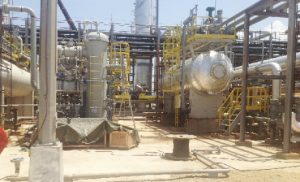The experts find it even more intriguing that the Ghana National Gas Company (Ghana Gas) which owns the plant allowed Sinopec, the Chinese firm which built the plant, to also act as the operations and maintenance (O&M) contractors, even when the defect liability period had not expired.
“I know the plant is a machine and mechanically something could happen within a day, but nine days after the declaration of commercial production, Ghana Gas is talking about mandatory planned maintenance? It must tell Ghanaians something more,” an industry expert, whose company is also building a thermal plant in the country, said on condition of anonymity.
The source believes that it is possible that for a new plant such as the Atuabo plant, faults and defects will be detected after a performance test has been conducted. On that occasion, the plant will be shut down for correction and re-launched into service.
Performance testing is the process of determining the speed or effectiveness of a mechanism, plant, network or software programme or device and different from mandatory planned maintenance.
Such an exercise should last the plant between two and three years for a major maintenance, depending on the warranty of the projects.
The engineer, therefore, suspects that the April 20 shutdown of the Atuabo Gas Processing Plant is due to a defect on the machines, rather than a planned maintenance in the real sense.
“Some of us are surprised at the declaration of commerciality by Ghana Gas when there was nothing is said about performance test,” the source wondered.
It said issues came up during the inauguration and findings were not made public. Besides, “the plant is a new one and Ghana Gas kept telling Ghanaians everything is fine. Ghana Gas should tell Ghanaians if it was a performance test, which is normal in the industry for new facilities,” it stressed.
Scheduled maintenance
When contacted, Ghana Gas representatives said it would not comment beyond what it had stated in a release it issued.
Ghana Gas issued a statement on April 10, advising stakeholders that it was scheduled to carry out the first planned mandatory maintenance shutdown on the Atuabo Gas Processing Plant, commencing April 20 to last for a few days.
It said the planned shutdown was the first since the inauguration and gas production began at the plant and that it was a mandatory outage required by the vendors for certain critical components in the gas processing plant, “particularly our compression facilities, which have been running for nearly 4,000 hours since installation and commissioning.”
However, industry experts have disputed the claim by Ghana Gas and challenged it to come up with the real issues and not cite mandatory planned maintenance in less than a year.
Fur thousand hours translates into 166 days, far less than a year of operation, should the plant run on a 24-hour production cycle.
Commercial production
Ghana Gas should not have declared commercial production when they did not tell Ghanaians that after the plant started receiving gas from day-one, there would be planned maintenance schedule.
The plant, after several failed completion dates, finally started operation in November 2014, with the commissioning (testing) phase, which produced about 50 million standard cubic feet per day. Commercial production started on April 1 with the announcement of a planned shutdown coming on the April 08.
Initial error
On the issues of the O&M, the experts said it would have been prudent for Ghana Gas to assign the role of operation and maintenance to a third party contractor.
The expert said allowing Sinopec, which built the plant to act as the O&M Company, would not guarantee fairness for the country; “It is a wrong move and I don’t know why Ghana went that direction.”
“The third party will carry out independent assessment and do the due diligence that the initial contractor Sinopec might fail to do and get it rectify within the defect liability period,” it added.
“But appointing the same contractor as the O&M to me is not the best especially in a third world country such as Ghana, if you leave it for the main contractor then you should also have a strong team of experts who understands and can question the process or in the end, the project will be handed to Ghana and we will see more troubles than this” he said.




